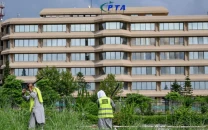The political economy of confrontation
If Pakistan chooses the path of confrontation with the US, it could mean stoppage of aid from the western world.

The political economy of confrontation
Pakistan, of course, has promptly issued a denial that any link exists between the military and the Haqqani network. However, US actions are likely to flow from their perceptions and not those of the Pakistan government. Three key elements of the US view of the matter emerged during the Senate hearings. The US is convinced that: (i) The Haqqani network is a “veritable arm of Pakistan’s Inter Services Intelligence…” as Admiral Mullen was reported to have said. (ii) The Haqqani network, with ISI support planned and successfully executed the September 13 attack on the US embassy in Kabul and at ISAF headquarters. (iii) The US regards the Haqqani network, based in Waziristan, as the “foremost threat to the US and coalition forces in Afghanistan” as Senator Carl Levin is reported to have observed.
The US military strategy holds that they reserve the right to take action against non-state terrorist organisations located in any country if, such organisations pose a threat to US security. In view of this military doctrine and the conception that the Haqqani network constitutes a “foremost threat”, US military action in North Waziristan is a distinct possibility.
Equally important, given the stated US position that the Haqqani terrorist group is linked to Pakistan’s military apparatus, the US could well mount a graduated set of pressures on Pakistan across the whole spectrum: economic, political and military. It may, therefore, be helpful to consider the economic and political consequences of what many believe is Pakistan’s policy of strategic ambiguity, in its war against terrorism: running with the hare and hunting with the hounds.
Pakistan’s economy is in the grip of stagflation with a protracted recession combined with double-digit inflation. Over one-third of the population is living below the poverty line and the majority is deprived of basic services. The situation has been worsened with the floods in Sindh.
If Pakistan chooses the path of confrontation with the US, it could mean stoppage of aid from the western world in general as it closes ranks to pressurise Pakistan. This could mean a loss of about $4.78 billion annually in foreign assistance, with distress repatriation of capital abroad. This could bring Pakistan’s reserves position (currently at $12.9 billion) to a crisis situation whereby, inflation could feed off exchange rate depreciation, quickly bringing tripple-digit inflation rates to an already distressed population. The balance of payments crisis could paralyse the economy with critical shortages of key commodities such as fuel, cooking oil, fertiliser and hence, food.
Pakistan is already under stress due to widespread violence by various Taliban groups and ethnic violence in the key port of Karachi. The economic collapse that could result from conflict with the West may intensify this stress to a critical level. The sovereignty of the state within its geographic domain could be seriously eroded, resulting from large scale disorder. It is time to change the paradigm of security policy and recognise that selective support for the Taliban is not only counter-productive for Pakistan’s internal security but could also bring the country into a catastrophic conflict with the western world.
Published in The Express Tribune, September 26th, 2011.













COMMENTS
Comments are moderated and generally will be posted if they are on-topic and not abusive.
For more information, please see our Comments FAQ